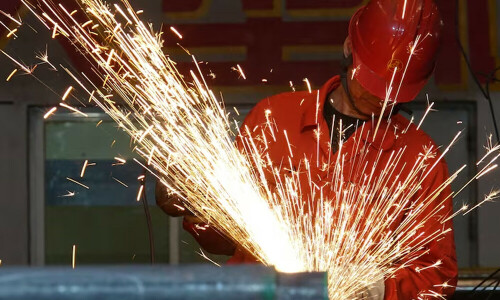China’s Industrial Profits Show Growth in Q1
Official figures released on Sunday indicate that China’s industrial profits experienced a resurgence in the first quarter. However, the ongoing trade tensions with the United States are expected to exert additional strain on this growth.
Economists and investors anticipate further supportive measures from the Chinese government to mitigate the impact on the nation’s economy. This is due to Washington’s assertive tariffs, which pose a risk to China’s vital export sector, and the absence of a defined timeline for trade discussions.
Data from the National Bureau of Statistics (NBS) reveals that the cumulative earnings of Chinese industrial firms saw a 0.8% increase, reaching 1.5 trillion yuan ($205.86 billion) compared to the previous year. This marks a turnaround from the 0.3% contraction observed during January and February.
In March alone, profits demonstrated a 2.6% year-on-year increase.
According to an industry representative, China’s Q1 automobile exports have increased 16% year over year.
Yu Weining, a statistician at the NBS, noted that the profit increase in the first quarter follows a 3.3% decrease in 2024, thereby reversing the trend of consistent declines in corporate earnings since the third quarter of the prior year.
The statement also noted that profits in the wearable smart device manufacturing sector experienced a significant surge of 78.8%, while those for household kitchen appliance manufacturers increased by 21.7%. This growth is attributed to a trade-in initiative for consumer goods.
China’s economic expansion exceeded expectations in the first quarter, bolstered by government stimulus measures that stimulated consumption and investment. However, persistent deflationary pressures continue to negatively impact corporate profitability and worker incomes as businesses navigate increasing trade disruptions.
Yu stated that the external environment is becoming increasingly intricate and challenging, with growing instability and uncertainty. He also mentioned that the government would enhance policy implementation and foster ongoing improvements in corporate profitability.
Beijing has been urging exporters to seek domestic consumers as an alternative to the U.S. market, which has been severely impacted by Washington’s 145% tariff increase on Chinese products. Nevertheless, numerous export-oriented factories have expressed concerns about weak domestic demand, pricing pressures, reduced profitability, and payment delays within the Chinese market.
The Communist Party’s Politburo affirmed on Friday its commitment to assisting firms and workers disproportionately affected by the U.S. tariffs. Furthermore, it indicated that new monetary instruments and policy financing mechanisms would be established to stimulate innovation, consumption, and international commerce.
The NBS data indicates that profits at state-owned enterprises decreased by 1.4% during the first quarter, while private-sector companies experienced a 0.3% decline. However, foreign firms reported a gain of 2.8%.
The industrial profit figures include companies with annual revenue of at least 20 million yuan from their core operations.



Comments (0)
No comments yet. Be the first to comment!
Leave a Comment